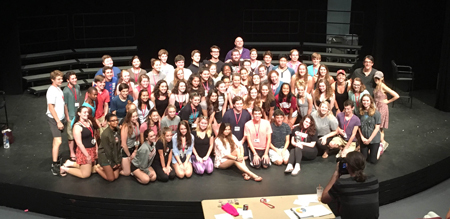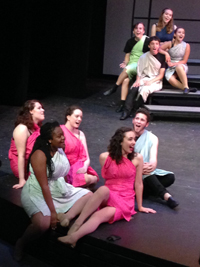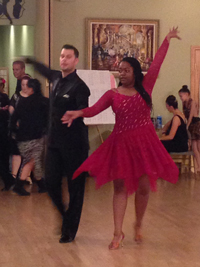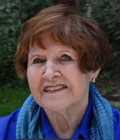ACTRESS JANET BARKHOUSE DESCRIBES HER TEACHING EXPERIENCES
Barkhouse retired from acting on the stage in various cities across Canada, and became an English teacher in Nova Scotia. She says, "I used drama in my classrooms, and wrote English Language Arts curriculum for the Province of Nova Scotia that included drama. I volunteered to direct plays and musicals at our school, and offered a part for every child who wished to participate, either as a character on stage, as a stagehand, as a promoter, lighting engineer, or as a set or costume designer, etc. By show time, everyone involved had memorized the lines and stage fright had been addressed. Once I adapted a Shakespeare scene for a grade five class. We divided the class into three groups. With the children's help, I 'translated' the scene into street slang for the first group, into standard English for the second group, and the third group read the play in the original Elizabethan dialogue. Later they performed it before their parents and friends."
"Participating in drama affects character development as well. Imagining how another creature might feel in a variety of situations develops empathy. Working on a team for a common goal teaches social skills. Children who don't excel in other fields, such as sports or academia, can often find a place in theatre where they feel special. Students who are good organizers make great stage managers and stagehands; the class clown can star instead of getting into trouble; shy artistic types can display their work by way of backdrops and props. You get the idea--a place for everyone. Even children who feel unwilling to participate can take roles as audience members, offering suggestions. I have to say that almost always those children soon see how engaging performing is and want to participate more actively."
"This brings me to the idea of fun as a learning and personal growth tool. You likely know Dr. William Glasser's Choice Theory, on which he based an education model called 'Quality Schools.' (1) After meeting our need to survive, humans must address four other needs: love and belonging, power, freedom and fun. Drama offers belonging to a group, the empowerment of creating something that others appreciate, the freedom to make your own meanings through character and set, and the fun of make-believe and playing with others."
"Working with high school students on after-class drama projects offers the same opportunities of belonging, of feeling power and freedom, and of having fun. Often very gifted performers were students who didn't know they could excel in anything until they heard others laugh at their antics, or cheer them on with applause. Earl Rutledge, who ran our Teachers' Centre, said to me once, years after he had seen the musical Jesus Christ Superstar that our high school put on, 'That was one of the best pieces of curriculum that I ever had the pleasure to witness.' And so it was: everyone involved in that challenging show grew as humans and team players; many grew as thinkers, as creators, as musicians, as dancers, as choreographers, as organizers. None of them got into trouble for the duration, either--it might have meant missing a rehearsal."
"So that's my experience of the value of doing drama with children. It's good for the adult volunteers, too. As I've been writing this, I've enjoyed a strong sense of accomplishment and delight in remembering--just as I imagine the students I worked with do!"
DRAMA AS A MEANINGFUL TOOL FOR TEACHING A NEW LANGUAGE
I am smiling as I recall my happy days of teaching English in Japan (1950-1953). Keisen Jogakuen, where I taught, had no text books for oral English, but the Japanese teachers of English and I worked out a plan. I would orally introduce each class to new English words first, and later the Japanese teachers would teach the girls to read the words and understand the grammar. Students learn when the situation is meaningful, and so on the day I was to teach the girls the simple present and present continuous verb tenses, we played baseball. We pushed the classroom desks aside and asked the girls to take positions and act the parts of players on our make-shift baseball diamond. We used a wad of paper as a ball, a ruler as a bat, and books for the bases. At first the girls repeated my words: "We play ball. The pitcher plays ball. The catcher plays ball. The pitcher is pitching the ball, the catcher is catching the ball, she is catching the ball," etc. "What is the pitcher doing?" The sentence patterns were familiar and the girls caught on. Before long the whole class was happily shouting answers to my questions, or students were waving their hands volunteering to speak. Every day we used drama and songs to teach English. In 1996-1997 I taught English to university students in China, and I used drama as a tool to give them meaningful settings for learning a new language. Our classes often resounded with laughter, and these mature students became creative and playful. Drama is a meaningful and delightful way to learn a new language.
PARENTS TALK ABOUT DRAMATIC ART PROGRAMS
Karen and Bryan (names changed) both worked so they could afford to send their three daughters to camps. "We wanted the girls to learn new skills, to see what really interested them. Growing up, if you're a bit shy, you feel out of your comfort zone, nervous, but everybody has to participate and hopefully the teacher will support you," Karen said. The girls attended general camps focusing on nature and group sports, tennis camps, music camps and art camps.
As the high school years approached, Karen and Bryan wanted to direct the girls' energies toward something they would enjoy and feel they were good at. They wanted the girls to look forward to school time and be working with classmates who were dedicated. They knew about the Etobicoke School of the Arts, a Toronto Board of Education high school (grades 9 through 12), which allows the students to focus on an art program of their choice, be it drama, dance, visual arts, music (band or strings), film or musical theatre. There are four long class periods each day and one of them is devoted to the major. The days rotate, A and B, so that the standard Province of Ontario courses (social sciences, science, math, languages and physical education) are offered in three of the periods, on alternating days. A high number of students meet the highest provincial standard test levels every year. (2) Karen and Bryan reasoned that this program would appeal to their girls since they were creative and had liked to play dress-up when they were little. "Furthermore, you don't hear about bullying. Children express themselves, but they are comfortable and respectful of each other." Applicants write an essay, have good grade 7 and 8 marks and perform an audition. (The oldest daughter prepared two songs and learned a short dance routine.) The school usually has about 1000 applicants, but only about 200 are accepted each year. Karen said, "There's a sense of pride if you're accepted." Karen was enthusiastic about the benefits her girls reaped at this school. "They learned to juggle many responsibilities. For example, they had to meet the demands of their core subjects as well as of rehearsals and creative projects. It was stressful, but they managed. They worked on teams to put together a performance or accomplish an art project, so grew to appreciate the contributions of others with differing abilities, ethnic backgrounds and lifestyles." She stressed that this program "keeps their imagination fluid--keeps colour in their lives, helps them think outside the box."
All three girls went on to college or university. The oldest daughter is now a visual merchandising manager of a major fashion and home furnishing store. She is responsible for how the store looks. The second daughter majored in drama. Working with Main Stage she was a Production Assistant involved in budgeting, editing, advertising, and the physical aspects of staging a play. She is presently working in the film industry where she is an Assistant Director. The third daughter studied music theatre during high school, and has just graduated with a degree in business management from Humber College. She will be working in the fashion industry. Karen says that the creative experiences her daughters had at the Etobicoke School of the Arts enabled them to follow and enjoy the careers of their choice.
A YOUNG CAMPER WRITES ABOUT HER EXPERIENCES WITH DRAMA CAMPS
Note: The following is an account of a young girl's summer camp experiences at Rider University's Westminster Choir College Vocal Institute on the Princeton University campus and Rider University Music Theatre Camp at Lawrenceville, N.J., two-week-long camps, which she has attended for the past five years. Both camps accommodate boys and girls of middle and high school ages and have campers from abroad as well as nearby American states.
Kayla writes: "I was really excited to go to camp this year, particularly since it will be my last year that I attend the Vocal Institute camp. I am graduating from high school next summer and will move on. I was excited to be singing and meeting new people. I have always loved the first day of camp because you get to see people that you met last year or meet a potential new best friend--someone that will be your friend forever. When I got to the dorm I was very surprised to see that I got air conditioning. It's very rare to have air conditioning at dorms on this university campus. Some counselors, that I didn't like last year, were there, and some people from my school also came to the camp, but I learned to ignore them and move on. On a daily basis, I freaked out because more was expected of us this year than in past years. I had to memorize up to two songs a day, and, in total, I memorized twelve songs or more. Mozart's Requiem was one of them. Every night after dinner we had to participate in evening activities, and some were really deep. For example, one of the activities was to stare into someone's eyes for thirty seconds, and then either describe their eye colour or compliment them. And right before we went to bed, we had a good-night circle. So by the time the first camp ended everyone was so close, and we didn't want to leave. The night I got home I immediately started to do laundry and get ready for Musical Theatre camp."

Kayla, Dramatic Arts Camper
"I was looking forward to attending Musical Theatre Camp the most. We worked on Xanadu, a musical parody of the 80's movie. It was way more intense than the vocal camp. Upon arriving at Rider University I was excited to see all of my friends from last year, and I was excited to be doing musical theatre. When I arrived at my dorm, I wasn't so lucky with air conditioning, but I ended up having a great first year roommate. Her name was Belle. As I was unpacking my things, and we were talking, I told her that as soon as you have been here a day, you feel like you've been here a month. During the first eight days of camp, every morning, we had classes: dance, voice and acting. In the afternoons we spent time working on Xanadu and variations from the musical Cabaret, which was a showcase filled with music by the composers Kander and Ebb. In the middle of the week we went to New York City to see the Broadway musical Chicago. At the end of camp, I was tired and emotional, but I was happy to have had this experience."

Rider University Music Theatre Campers, 2016
"Making friends was easy at both camps since we were in specific interest groups. Also on the first day, we did so many getting-to-know-you activities. At the end you had the people you hung out with whenever you could, and you had the people you would just be friendly to. Performing in the Princeton University chapel and singing Mozart's Requiem was the highpoint for me at Vocal Institute. At Musical Theatre Camp my highpoints were meeting Alice Ripley, an award-winning actress and star, who gave a talk and acted for us, and seeing Chicago. I met so many people and learned so many things. Over the years I have stayed in connection with many people from camp. I have also learned great audition tips for use in the future, and I have made great connections with people. I expect to be going to college soon to study business and musical theatre. These experiences at camp help me to know what college will be like."
 |
 |
|
| Rehearsal (Kayla in toga. She sang solo earlier) (left) Kayla performing with Latin Dance teacher (right) | ||
JOBS AND ENTREPRENEUR POSSIBILITIES FOR TODAY'S GRADUATES OF HIGH SCHOOL, COLLEGE AND UNIVERSITY
Modus Research in Toronto conducted a poll of 823 Ontario business leaders about whether universities were preparing job applicants for the needed work force and found that there was more dissatisfaction than there had been ten years ago. While the poll did not ask employers the reasons for their dissatisfaction, Charlie Graves, of the research firm, believes it is "a shift to focus on technical training" so that graduates don't develop "good communication, writing and strategic-thinking skills." He found that companies looking to fill higher positions in the firm wanted an applicant "with broad analytical and communication skills," while they preferred applicants with specific skills to fill lower positions. (3)
By "specific skills" required for lower level jobs, I assume that he is talking about such things as computer, mechanical, secretarial and bookkeeping skills. I've been tutoring job applicants for management positions, helping them upgrade skills in writing and public speaking, and I think I know what Graves was talking about. When writing business letters or giving directions or advice, I found that my students wrote long, involved, confusing sentences. They had trouble organizing their message in a logical sequence. Some used a style that was too familiar, and some wrote too formally. Public speakers also had trouble organizing their talks, did not enunciate clearly and spoke too fast without pausing for phrase, clause and sentence breaks. They had not learned to project their voices, and to manage stress. Conveying their ideas orally was going to be a skill required during meetings as well as during public presentations. From my experience, these writing and speaking skills are fostered though experience in a drama group.
In an Elle magazine article about business opportunities in Canada, Ra writes: "A growing number of Canadians are starting their own businesses...92% of small business owners are satisfied with their work compared with 82% of Canadians in general...Small businesses account for between 60 and 80% of all jobs created in Canada....Studies show that entrepreneurs with education in entrepreneurship, or previous entrepreneurship experience, have an 80-90% chance of success with a new business." (4)
During the twenty-seven years that my late husband and I ran an auction business, I liked to hire students from the Ontario College of Art. I found that these students were self-starters. They could take on an assignment, ask a few questions and carry out the work with little supervision, often in a surprising, creative manner. They relished the responsibility of applying their own ideas and were happy workers. I believe that art programs prepare young people for pleasant, successful lives.
CONCLUSION
As Barkhouse wrote earlier, Glasser reminds us that after our survival needs are met, humans require the satisfaction of our needs for love, belonging, freedom, and fun. Participating in dramatic art programs addresses these needs. Through drama programs young people develop many skills and learn to empathize with people who are different. In addition, drama can become a meaningful and delightful way to learn a new language. I believe that dramatic art programs prepare young people for pleasant daily lives and success in management positions.
REFERENCES:
- 1. "William Glasser Institute - Home Choice Theory." www.wglasser.com/. Retrieved August 6, 2016; "Quotes - Brainy Quotes." www.brainyquote.com/question/author/w/william_glasser.html. Retrieved August 12, 2016.
- 2. "Etoicoke School of the Arts (ESA)." www.esainfo.ca/. Retrieved August 12, 2016
- 3. McFarland, Janet. "Graduates not prepared for the work force, executives say." The Globe and Mail. www.pressreader.com/canada/the-globe-and-mail.../28179208414102. Retrieved August 8, 2016
- 4. Ra. "A Career as a Self-employed Individual--How Toronto Reference Library can help." Elle [magazine], August 8, 2013. http://Torontopubliclibrary.typepad.com/jobhelp/.../career-as-self-employed-how-to. Retrieved August 8, 2016



 Marlene Ritchie
Marlene Ritchie










